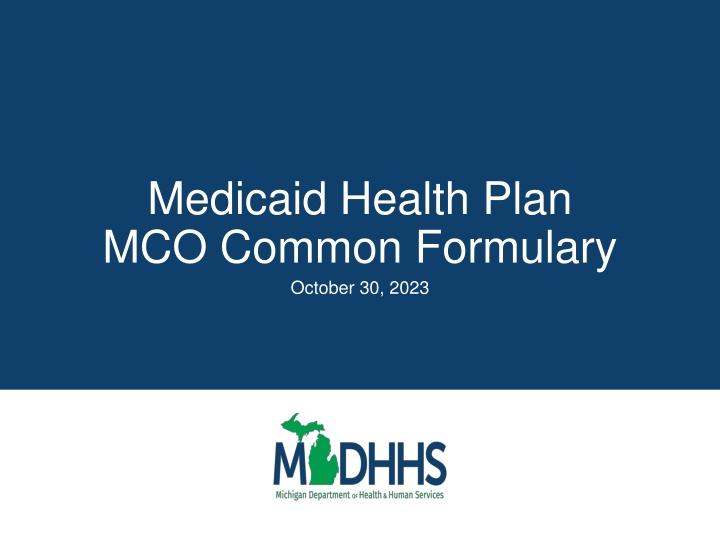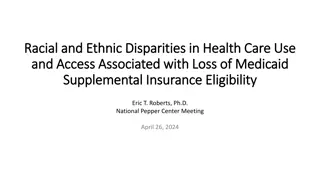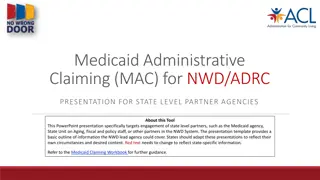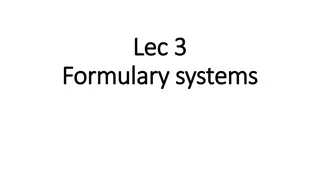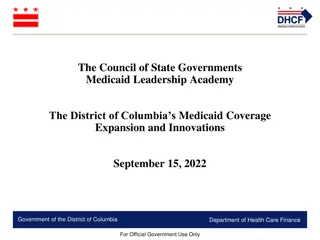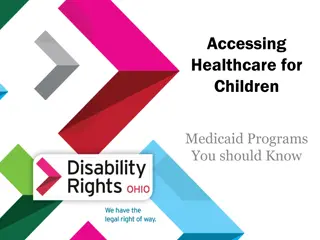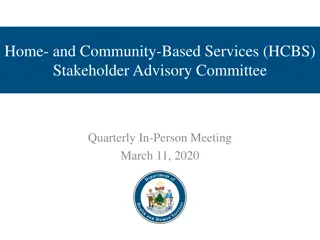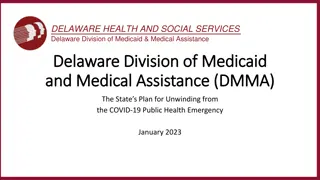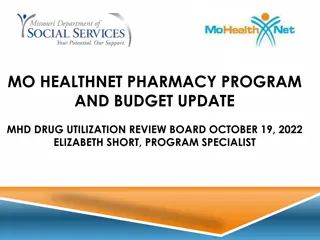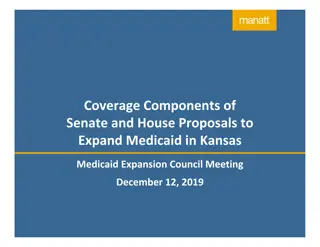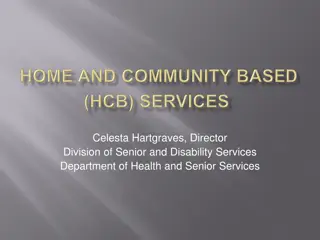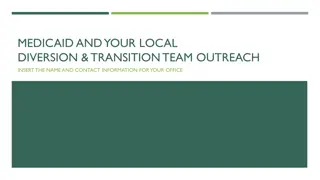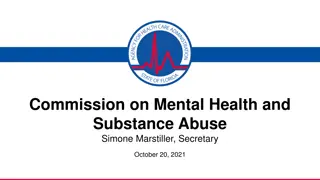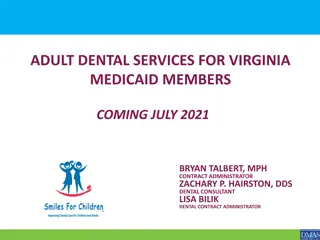Medicaid Health Plan MCO Common Formulary Stakeholder Meeting Overview
The Michigan Department of Health and Human Services (MDHHS) is holding its eighth annual public stakeholder forum to discuss the Medicaid Health Plan Common Formulary. The meeting aims to gather input from the public, stakeholders, and interested parties about the formulary. Attendees will have the opportunity to ask questions and provide feedback. The Common Formulary, in place since 2016, pertains to pharmacy claims paid by Medicaid Health Plans and does not cover medical claims. Individual participation is encouraged through written or verbal questions.
Download Presentation

Please find below an Image/Link to download the presentation.
The content on the website is provided AS IS for your information and personal use only. It may not be sold, licensed, or shared on other websites without obtaining consent from the author.If you encounter any issues during the download, it is possible that the publisher has removed the file from their server.
You are allowed to download the files provided on this website for personal or commercial use, subject to the condition that they are used lawfully. All files are the property of their respective owners.
The content on the website is provided AS IS for your information and personal use only. It may not be sold, licensed, or shared on other websites without obtaining consent from the author.
E N D
Presentation Transcript
Medicaid Health Plan MCO Common Formulary October 30, 2023
MISSION: Michigan Department of Health and Human Services (MDHHS) provides opportunities, services, and programs that promote a healthy, safe and stable environment for residents to be self-sufficient.
Welcome and Panel Introductions Penny Rutledge (Director, MDHHS Bureau of Medicaid Care Management & Customer Service) Jed Miller, M.D. (Chief Physician, MDHHS Office of Medical Affairs) Trish Bouck (Director, MDHHS Pharmacy Management Division) Geraldine Marks, PharmD. (HAP CareSource) Chris Meny, R.Ph. (Blue Cross Complete)
Purpose of the Meeting The purpose of our meeting today is to provide an annual forum for the public, stakeholders, and interested parties to comment on the Medicaid Health Plan Common Formulary. This is the eighth annual public stakeholder forum and supplements the quarterly written public comment opportunities. Please note that this meeting is not intended to be a venue for pharmaceutical drug product-specific presentations.
Meeting Format We will provide a general overview of the Medicaid Health Plan Common Formulary. There will be an opportunity after the presentation to ask additional questions. Questions can be asked throughout as well. To allow us to review and post written responses after the meeting, please put questions in writing. Questions submitted in advance of the meeting will be read and responded to first. Individuals joining the stakeholder meeting will be asked for questions by first using submitting a question in chat, followed by unmuting to speak when prompted by the facilitator.
Meeting Format There are no limits on the number of questions (but to allow everyone opportunity, individuals should limit to no more than two questions at a time, unless instructed otherwise). If you do not wish to ask your question during the meeting, you may submit your questions to the Common Formulary mailbox at MDHHSCommonFormulary@michigan.gov Panelists may respond to questions during the meeting or choose to defer a response pending further review.
MHP Common Formulary A base formulary that is common across all health plans for the current Comprehensive Health Plan contract year. First created as required under Section 1806 of Public Act 84 of 2015 and fully implemented September 30, 2016. The Common Formulary only applies to pharmacy claims paid by Medicaid Health Plans it does not apply to MHP medical claims or Fee-for-Service paid medical or pharmacy claims
Purpose of the Common Formulary Promote continuity of care. Reduce interruptions in a beneficiary s drug therapy due to a change in health plan. Streamline drug coverage policies and reduce administrative burden for providers. Facilitate collaboration among health plans.
Website Michigan.gov/MCOpharmacy Medicaid Health Plan Common Formulary Prior Authorization Criteria Standard Prior Authorization Form Step Therapy Criteria Medicaid Health Plan Contact Information General Frequently Asked Questions (FAQ s) Public Comment Notice Drug Class & Workgroup Review Schedule Common Formulary Mailbox MDHHSCOMMONFORMULARY@MICHIGAN.GOV
MHP Common Formulary Review MDHHS convenes a MHP Common Formulary Workgroup of representatives from current contractors. See next slide for more details. The Workgroup makes its drug coverage recommendations to MDHHS. The MDHHS then shares the Workgroup recommendations with Michigan Pharmacy & Therapeutics Committee. MDHHS has final approval authority following a comprehensive clinical review and recommendation by the Department s Office of Medical Affairs physicians.
Common Formulary Workgroup (As of October 18, 2022)
MCO Common Formulary Workgroup The contracted Medicaid Health Plan s Medical Directors and Pharmacy Directors are invited to participate in the Workgroup.
Workgroup Recommendations The recommendations made by the Workgroup to MDHHS included: Drugs to include in the MHP Common Formulary Utilization Management of included drugs The purpose of Utilization Management is to ensure the drug being used is medically necessary, clinically appropriate, safe for the patient, and a cost-effective treatment option for the clinical circumstances. Examples of Utilization Management include, but may not be limited to: Prior Authorization (PA), quantity limits, age edits
Michigan Pharmaceutical Product List (MPPL) The Medicaid Health Plans are contractually required to have a process to approve physicians requests to prescribe any medically appropriate drug that is covered under the Michigan Pharmaceutical Product List (MPPL). Exception: Those products on the MPPL that are carved-out and billed at point-of-sale as a Fee-For-Service pharmacy benefit.
Drugs That Are Carved Out of Managed Care Carve-Out drugs currently billed as a Fee-for- Service point-of-sale pharmacy benefit that will remain unchanged, include but are not limited to: HIV antivirals Behavioral Health/Psychotropics Select substance abuse treatments
MDHHS Public Health Initiatives Oral Contraceptives: up to 12-months supply per fill Tobacco Cessation products Naloxone nasal spray and vials to reduce effects of opioid overdose Opioid safety edits Covid-19 public health emergency coverages
Products Covered As A Medical Benefit The Common Formulary includes drugs that are covered as an outpatient point-of-sale pharmacy benefit. Examples of products that are not identified on the Common Formulary because health plans may continue to cover as a medical benefit including, but not limited to: Physician-administered injectable drugs Vaccines Intrauterine Devices
Vitamins and Supplements Prenatal vitamins are available for coverage for women of child-bearing age. Vitamin D, Folic Acid and fluoride are available for coverage for select ages and conditions. Additional select vitamins are covered only for members in the Children s Special Health Care Services (CSHCS) program as indicated on the Michigan Pharmaceutical Products List (MPPL).
Transition of Formulary Changes Formulary changes do occur periodically. These changes are usually a result of new drugs becoming available, clinical efficacy studies, and drug cost or manufacturer rebate changes. For safety and continuity of care reasons, Health Plans can approve additional transition time based on their clinical judgement related to individual member medical necessity reviews and any prescriber impact analyses. Additionally, the Workgroup can make recommendations to MDHHS for grandfathering of coverage based on member utilization and to ensure the smoothest transition possible for Plan members.
Maintenance of Common Formulary The MDHHS leads the MHP Common Formulary Workgroup meetings. The physicians in the Department s Office of Medical Affairs serve in a clinical advisory role while the Department s Pharmacy Management Division staff serve in an operational oversight role The Workgroup meets at least quarterly to discuss new drug products. Each drug class is reviewed at least annually by the Workgroup. The drug review schedule is on the website.
Maintenance of Common Formulary This is the eighth Common Formulary Stakeholder Meeting that MDHHS has held, and MDHHS continues to support holding annual in-person stakeholder meetings on the Common Formulary in addition to quarterly written public comment ALL public comment including recommendations submitted to the Common Formulary mailbox and brought from the Plan s workgroup representatives (e.g. Plans P&T Committees recommendations) are reviewed/considered. Public Comment submitted to MDHHSCommonFormulary@Michigan.gov during the quarterly public comment period will be responded to with receipt acknowledgement and subsequent review outcome.
The Single PDL (10/1/2020) Recommended in the Governor s FY21 Executive Budget, the Department implemented a single Medicaid Preferred Drug List (PDL) to maximize drug manufacturer rebates (both Federal and PDL supplemental) and generate savings starting October 1, 2020 [Original estimated savings ~$182.9M Gross] The Department issued the final policy (i.e. MSA-20-51) on July 1, 2020 Effective 10/1/2020: Medicaid Health Plans Common Formulary coverage fully aligned with the Fee-For- Service (FFS) coverage of products on the Michigan PDL/Single PDL found at: https://michigan.magellanrx.com/provider/
Single PDL coverage in Common Formulary This policy requires a Single PDL to be utilized by both Medicaid Fee-For-Service (FFS) and Medicaid Managed Care Organization (MCO) plans for pharmacy coverage of preferred products. A Preferred Drug List (PDL) is a subset of drugs on a formulary. Reminder: not all drugs/drug classes are listed on the Single PDL. Coverage of drugs not on the PDL continues to be managed by the MCO Common Formulary Workgroup and final approve by MDHHS. Coverage, PA Criteria, and links to each of the plans can be found here: www.michigan.gov/MCOPharmacy Pharmacies are encouraged to review brands that are preferred over generics and quarterly Single PDL changes at: https://michigan.magellanrx.com > Provider > Documents > Other Drug Information > Brand Preferred Over Generic Products List.
Single PDL coverage in Common Formulary
Single PDL coverage in Common Formulary The Michigan Pharmacy and Therapeutics Committee makes clinical recommendations to the Department for both the Michigan Pharmaceutical Product List (MPPL) and the subset of drugs on the PDL. To ensure comprehensive clinical review and considerations (across both FFS and Managed Medicaid), the MCO Common Formulary workgroup s clinical input will be part of future PDL considerations IMPORTANT: Drugs not on the PDL will continue to be managed by the MCO Common Formulary for Plan enrollees Existing processes allow FFS and MCO to consider individual medical necessity Prior Authorizations exceptions to cover PDL Non-Preferred agents
Whats Was New in 2022 Public Act 19 of 2022 Effective June 8th of 2022 Revised MCL 400.109h: Added Opioid Withdrawal Symptom Management drugs as protected from prior authorization Extended the prior authorization protections to coverage by Medicaid Health Plans for drugs in protected classes (in addition to longstanding Fee-For-Service Medicaid coverage)
Coverage Requirements Contracted Health Plans must cover PDL drugs following the Single PDL coverage parameters and PA Criteria. For non PDL drugs, contracted Health Plans may be less restrictive, but not more restrictive, than the coverage parameters of the MCO Common Formulary. Health plans may cover additional drugs than those identified on the MCO Common Formulary Health plans may have utilization management tools that are less stringent than those on the MCO Common Formulary [limited to non PDL drugs] Medicaid Health plans are contractually required to have a mechanism to cover medically necessary products on the MPPL even if the drug is not listed on the MCO Common Formulary
Compliance Monitoring: Formulary Maintenance Medicaid Health Plans are required to investigate and correct any deficiencies that are either reported or discovered by audit or regular compliance monitoring Providers, members of the public, any stakeholders are encouraged to report any issues and concerns regarding health plan compliance to: MDHHSCommonFormulary@Michigan.gov Common issues reviewed for compliance: Prior authorization denials/timeliness concerns Coding of pharmacy claims Lack of coverage consideration of a particular drug
Compliance Monitoring: Formulary Maintenance Major Health Plan MCO Common Formulary contract requirements: Provide a response to prior authorization requests within 24 hours of receipt Must have a process to approve requests for any medically appropriate drug, vitamin, or supplement that is covered on the Fee-For-Service Medicaid Pharmaceutical Product List (MPPL) Coverage cannot be more restrictive than what is established under the MCO Common Formulary A unique set of pharmacy billing identifiers (BIN/PCN/Group) for the Plan s Medicaid lines of business Timeliness requirements for coding MDHHS approved formulary changes A process for and timely response to MAC pricing review requests
Public Comment: Formulary Maintenance The public is encouraged to submit written comment on drug coverage determinations to be reviewed by MDHHS and the Workgroup during the quarterly meetings. The quarterly requests for public comment, including upcoming drug classes to be reviewed can be found at Michigan.gov/MCOpharmacy. Please refer to the MDHHS quarterly request for public comment for details. You will receive an acknowledgement that your comment was received then later of the outcome
Drug Class & Workgroup Review Schedule 2023 www.Michigan.gov/MCOPharmacy Scroll to bottom of webpage:
Frequently Asked Questions About MCO Common Formulary Q: What is the workgroup review schedule in order for the public to provide comment? What is the best method to provide comment? A: The MCO Common Formulary Workgroup review schedule piggybacks off the FFS P&T Committee quarterly meetings. The Drug Review and Workgroup Schedule (including corresponding public comment periods) is available at: www.Michigan.gov/MCOpharmacy
Frequently Asked Questions About MCO Common Formulary Q: How will updates to the formulary be communicated? A: The updated formulary will be posted after completion of the approval process following quarterly MCO Common Formulary Workgroup meetings. A list of formulary changes that occurred prior to (pre) and then after (post) implementation of the Single PDL is available from the website at: www.Michigan.gov/MCOPharmacy.
Frequently Asked Questions About MCO Common Formulary Q: How will drug manufacturers present clinical information about drugs to the plans? A: There is no change. Drug manufacturers continue to use the same process as prior to the MCO Common Formulary implementation. The Health Plans still have their own P&T Committees. This information should still be forwarded to the plans for review by their committees. The plans will then bring any resulting recommendations to the MCO Common Formulary Workgroup.
Frequently Asked Questions About MCO Common Formulary Q: Is a drug that is listed on the Michigan Pharmaceutical Product List (MPPL) automatically covered on the MCO Common Formulary? A: No, if a drug is on the MPPL found at https://michigan.magellanrx.com/>> Providers >> Documents>> Fee-For-Service Drug Coverage>>MPPL Introduction, but not covered on the MCO Common Formulary, the Health Plans must have a means to cover that drug through a non- formulary prior authorization process. Refer to the second page of the Medicaid Health Plan Common Formulary found at Michigan.gov/MCOpharmacy.
Frequently Asked Questions About MCO Common Formulary Q: Can plans cover a drug before it is on the MPPL? A: New drug products are usually on the market for 6 months before considered for formulary addition. Due to the ability to be less restrictive, plans could choose to cover a drug prior to it being put on the MPPL. A non-formulary prior authorization can always be requested for medical necessity coverage considerations.
Frequently Asked Questions About MCO Common Formulary Q: What type and how much advanced notice do members/beneficiaries receive when a product s coverage is changed? A: The Medicaid Health Plans can be less restrictive than the Common Formulary for drugs not on the Single PDL, so some plans may choose to grandfather (e.g., continue) coverage of their members for a period of time, and/or for certain members/diagnoses. When any more restrictive coverage change is implemented, Plans must provide impacted members an adverse action notice at least 10 business days in advance. To prevent medication disruption/access issues, most Plans provide notice to both prescribers and members at least 30, 60, or 90 days in advance (in particular if not grandfathering coverage)
Frequently Asked Questions About MCO Common Formulary Q: How soon after coverage changes on the Common Formulary does it impact a member/beneficiary? A: If the Workgroup votes to change coverage of a product to be more restrictive or non-covered, the enrollee may have to get prior authorization for continued coverage. The Plans have 45 to 60 days to code Department approved changes that occur after quarterly meetings. Note: Some coverage changes include grandfathering coverage for established members.
Frequently Asked Questions About MCO Common Formulary Q: Is the FFS PA criteria the same as the published MCO Common Formulary PA Criteria? A: For products on the Single PDL, the PA criteria will be the same for both FFS and MCO Common Formulary. For products not listed on the Single PDL, the criteria may differ. PA criteria for the MCO Common Formulary is publicly available at: www.Michigan.gov/MCOPharmacy. This Common Formulary PA criteria document includes the criteria for both the Single PDL products and Common Formulary products not listed on the Single PDL.
Frequently Asked Questions About MCO Common Formulary Q: Are each of the plans going to have the same PA length of approval? A: The PA length of approval may vary by drug and can be found in the Duration of Approval within the PA Criteria document found at: www.Michigan.gov/MCOpharmacy . The most common length of approval is for one year.
Additional Questions/Answers MCO Common Formulary Q: Are medical benefit drugs listed on the MPPL? A: Neither the MPPL nor the Medicaid Health Plan Common Formulary list medical benefit drugs. Medical benefit drugs are drugs that are billed on the professional or institutional claim format and are administered by a health care provider in a clinic, office or outpatient hospital. The MPPL and Medicaid Health Plan Common Formulary list drugs that are covered as an outpatient pharmacy benefit. A pharmacy benefit includes drugs billed by a retail pharmacy or other outpatient pharmacy that the individual either self- administers or is safely administered in the patient s residence by a trained family member or caregiver.
Additional Questions/Answers MCO Common Formulary Q: How are vaccines covered? A: Vaccines are identified in the cover pages of the Medicaid Health Plan Common Formulary as a medical benefit that are therefore not listed in the MCO Common Formulary. Plans may be less restrictive and can also cover them as a pharmacy benefit. Many Medicaid Health Plans also cover vaccines as a pharmacy benefit. Please always refer to the individual health plan formulary for more details.
Additional Questions/Answers MCO Common Formulary Q: Is the Managed Care Health Plan Common Formulary saving taxpayer dollars? A: The original goal of the Medicaid Health Plan Common Formulary was, and remains, to relieve provider burden and to improve continuity of care. It came about to address medical community concerns around the need to streamline drug coverage policies for Medicaid and Healthy Michigan Plan members and providers. In recent years, the Department implemented a Single PDL which was a major cost savings initiative. There are legislative boilerplate reports that monitor the savings annually starting FY2021.
Additional Questions/Answers MCO Common Formulary Q: Does the State have influence to assure pharma has access to the Health Plans? A: The Department has not changed this process. Pharma can continue to meet with the Health Plans prior to the Workgroup meetings as well as provide Public Comment to the Department quarterly. Public Comments that are submitted by pharma received are shared with the Workgroup members.
Additional Questions/Answers MCO Common Formulary Q: Is there transparency, like availability of the names of the Therapeutic Sub-Groups/Working Committee members reviewing drug classes? A: There is a random assignment of sub-groups which consist of two or three plans who are assigned to present their drug class review and lead Workgroup discussion. The list is now published to the website at www.Michigan.gov/MCOpharmacy (e.g., scroll down to the bottom and look for Drug Class & Workgroup Review Schedule ). Information provided through Public Comment is shared with entire Workgroup for review and vote.
Additional Questions/Answers MCO Common Formulary Q: Is there guidance on who to contact or forward information to for medications covered under medical benefit side of the plan for both FFS and the Medicaid Managed Care Health Plans? A: The Department updated its website to further clarify medical benefit coverage for the FFS program. This includes the identification of Medicaid Health Plan medical benefit carve outs. Questions regarding FFS medical benefit questions can be directed to MSAPolicy@michigan.gov . Plans should be contacted directly for medical benefit coverage.
Additional Questions/Answers MCO Common Formulary Q: Continuity of care has been mentioned between Medicaid Managed Care Health Plans What about continuity of care between FFS Medicaid to the Medicaid Managed Care Health Plans since members are transitioned to Medicaid Managed Care? A: The Medicaid Health Plan Common Formulary was originally created to provide continuity between the Health Plans. The Medicaid Health Plans do consider transition of care coverage requests for members newly enrolled into managed care. The Single PDL has further expanded continuity of care for members who start out FFS Medicaid and become eligible for transition to Managed Care.
Additional Questions/Answers MCO Common Formulary Q: Where can someone sign up for Public Comment notification? A: If you would like to receive notices of quarterly Public Comment, please subscribe to the Medicaid ListServ. The subscription instructions are found here: http://www.michigan.gov/documents/LISTSERV_127 789_7.pdf.Please select either MHP_PROV or PHARM_PROV . This subscription-based e-mail service notifies subscribers of important news relative to the Michigan Medicaid Health Plan and Pharmacy Programs, including Public Comment notices.
Additional Questions/Answers MCO Common Formulary Q: How do oncology drugs fall into the review process for the Common Formulary? A: Oncology drugs are included the drug class review schedule for the Common Formulary. Notification of upcoming drug class reviews and public comment periods are listed on the MCO Common Formulary website.
Additional Questions/Answers MCO Common Formulary Q: Are oncology new drugs reviewed by the Common Formulary on an ad-hoc basis? A: The Common Formulary includes an annual review of oncology drugs within the antineoplastic drug class review. Effective June 8, 2022 as a result of Public Act 19 of 2022, the MCO Common Formulary coverage was updated for drugs used to treat cancer. Cancer treatments, such as chemotherapy, are now covered without prior authorization by Medicaid Health Plans in addition to Fee- For-Service Medicaid.
